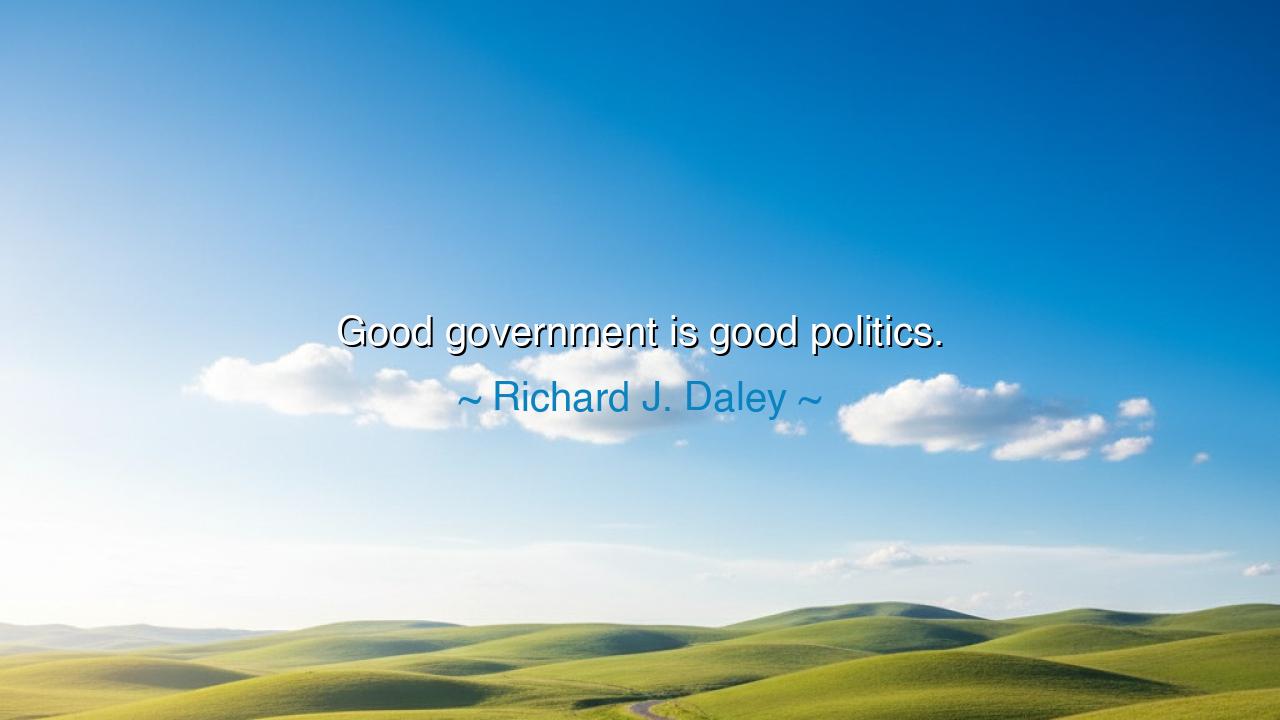
Good government is good politics.






"Good government is good politics." Thus spoke Richard J. Daley, the legendary mayor of Chicago, a man who ruled his city like a modern-day chieftain, fierce in loyalty and relentless in purpose. Though his words seem simple, they carry the weight of centuries of wisdom — the eternal truth that the strength of Politics lies not in deceit, nor in empty show, but in the steady and righteous work of Governance. For Government and Politics, though often seen as rivals — one of principle, the other of persuasion — are in truth two sides of the same coin. When a ruler governs well, he does not need to manipulate hearts, for the people will love him through the justice of his deeds.
Daley spoke these words not as a philosopher in a quiet study, but as a man of power, immersed in the noise and toil of the political world. As mayor of Chicago from 1955 until his death in 1976, he stood at the center of one of America’s most turbulent eras — a time of civil rights marches, riots, and fierce urban change. He understood, perhaps better than most, that Politics is not merely the art of winning elections, but the art of keeping faith with the people after victory is won. “Good government is good politics,” he declared, because he knew that lasting political power could not be built on corruption or illusion alone; it must be nourished by service, by competence, and by the tangible betterment of the citizens’ lives.
The meaning of Daley’s words reaches beyond his city, beyond his century. A government that works — that builds roads, protects families, delivers justice, and honors truth — earns the loyalty of its people more deeply than any speech or promise ever could. Good governance, in this sense, is the highest form of politics, for it wins not just votes, but trust. It transforms the relationship between ruler and ruled from one of transaction into one of faith. When leaders do what is right, even in silence, their actions echo louder than all the rhetoric in the world.
History has shown this lesson many times. Consider the reign of Marcus Aurelius, the philosopher-emperor of Rome. Surrounded by the intrigues of court and the chaos of empire, he ruled not by manipulation, but by wisdom. He wrote in his journals that the duty of a leader was to serve the common good and to act justly, regardless of the crowd’s applause. And though centuries have passed, his legacy endures — not because he played politics with cunning, but because his governance reflected virtue. Like Daley’s maxim, his rule embodied the truth that when leaders govern with fairness and integrity, their politics flourish naturally, like a tree rooted in deep soil.
But the opposite is also true. When leaders neglect the principles of good government, their politics decay, no matter how dazzling their performance. The ruins of empires, the fall of kings, and the collapse of republics all bear witness to this truth. For corruption breeds distrust, and distrust breeds rebellion. A government that fails its people may still cling to power for a time through fear or deceit, but its foundation will crumble from within. To lead badly is to sow one’s own destruction; to govern well is to build a legacy that no enemy can destroy.
Daley’s own Chicago was not without controversy, yet even his critics admitted his mastery of practical governance. Under his watch, the city grew into a modern powerhouse — its streets repaired, its economy strengthened, its skyline transformed. He understood that political strength was not sustained by mere slogans, but by results. His maxim was both wisdom and weapon: by governing effectively, he ensured his enduring power. Yet, more importantly, he reminded all who followed him that the public good and political success need not be enemies. In truth, they are bound together, each nourishing the other when guided by integrity.
The lesson, then, is clear: to lead well, one must serve well. The best politics is not the art of winning arguments, but the art of doing what is right — of listening, building, and uplifting. Citizens, too, must learn to demand substance over spectacle, deeds over words, and virtue over vanity. A society that values performance more than performance of duty invites its own decline. But when people honor the quiet labor of honest governance, they ensure that their leaders rise not by deceit, but by excellence.
So remember the wisdom of Richard J. Daley: “Good government is good politics.” It is a call not only to rulers, but to all who hold any measure of power — in communities, in businesses, in their own homes. Do your work well, serve with sincerity, and let results speak where rhetoric cannot. For in every age, the truest and most enduring form of politics is the trust that good governance inspires — a trust that outlasts elections, outshines ambition, and endures long after the names of men have faded into dust.






AAdministratorAdministrator
Welcome, honored guests. Please leave a comment, we will respond soon